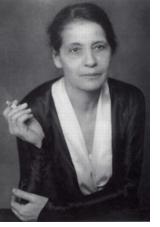Lise Meitner
physicist, b. 7 November 1878 (Vienna, Austria), d. 27 October 1968 (Cambridge, England)
 The third of eight children of a Viennese Jewish family, Lise Meitner was already 22 years old when Austrian restrictions on the education of women eventually allowed her to enrol at the University of Vienna in 1901. Her interest was in physics, and Ludwig Boltzmann's lectures convinced her that physics was to be her career.
The third of eight children of a Viennese Jewish family, Lise Meitner was already 22 years old when Austrian restrictions on the education of women eventually allowed her to enrol at the University of Vienna in 1901. Her interest was in physics, and Ludwig Boltzmann's lectures convinced her that physics was to be her career.
Having graduated in 1907 Meitner went to Berlin to study with Max Planck and began to work with Otto Hahn on radioactive substances. The chemist Hahn and the physicist Meitner made a powerful team, and their collaboration lasted for three decades. Hahn and Meitner each headed a section in Berlin's Kaiser Wilhelm Institute for Chemistry.
In 1934 Enrico Fermi produced radioactive isotopes by neutron bombardment. Meitner, Hahn and Fritz Strassmann studied the isotopes produced from radium. The question arose whether any of the several products resulting from the bombardment could be unknown transuranic elements.
Four years of work did not provide an answer. By that time the situation of Jews had become very precarious in Germany, and although Lise had converted to Christianity already in 1908 - , two of her sisters had become Catholics and Lise a Protestant - Jews of every denomination were in danger under Hitler's regime. When Hitler annexed Austria in 1938 Meitner decided to emigrate. She went to Stockholm, where she was given "laboratory space but no collaborators, equipment, or technical support, not even her own set of keys." (Sime, 1996)
Meitner stayed in contact with Hahn through correspondence, and in November 1939 both met in secret in Copenhagen. Meitner suggested some new experiments, and when Hahn and Strassmann performed them in Berlin they discovered that the mysterious bombardment products were not transuranic elements but the known element barium. They published their discovery in Naturwissenschaften, while Meitner explained the observations a month later in a paper, co-authored with her nephew Otto Frisch, in Nature and named the process "fission."
The wide ramifications and possible applications of nuclear fission, one of the most fundamental discoveries of science, were soon realized. Otto Hahn received the Nobel Prize in Chemistry in 1945 (dated 1944 but withheld until the end of the war) for its discovery. Lise Meitner was ignored by the Nobel committee, and the official biography of Nobel Laureates published on behalf of the Nobel Foundation does not mention Meitner's contribution or her paper in Nature.
In 1960 Meitner retired to England. In 1966 a belated move to do justice to Meitner's work led to the awarding of the Fermi Prize of the USA to Hahn, Meitner and Strassmann.
References
Sime, R. L. (1996) Lise Meitner: A Life in Physics. University of California Press.
The San Diego Supercomputer Center (undated) Women in science: Lise Meitner, a battle for ultimate truth. http://www.sdsc.edu/ScienceWomen/meitner.html (accessed 25 July 2004)
home
 The third of eight children of a Viennese Jewish family, Lise Meitner was already 22 years old when Austrian restrictions on the education of women eventually allowed her to enrol at the University of Vienna in 1901. Her interest was in physics, and Ludwig Boltzmann's lectures convinced her that physics was to be her career.
The third of eight children of a Viennese Jewish family, Lise Meitner was already 22 years old when Austrian restrictions on the education of women eventually allowed her to enrol at the University of Vienna in 1901. Her interest was in physics, and Ludwig Boltzmann's lectures convinced her that physics was to be her career.